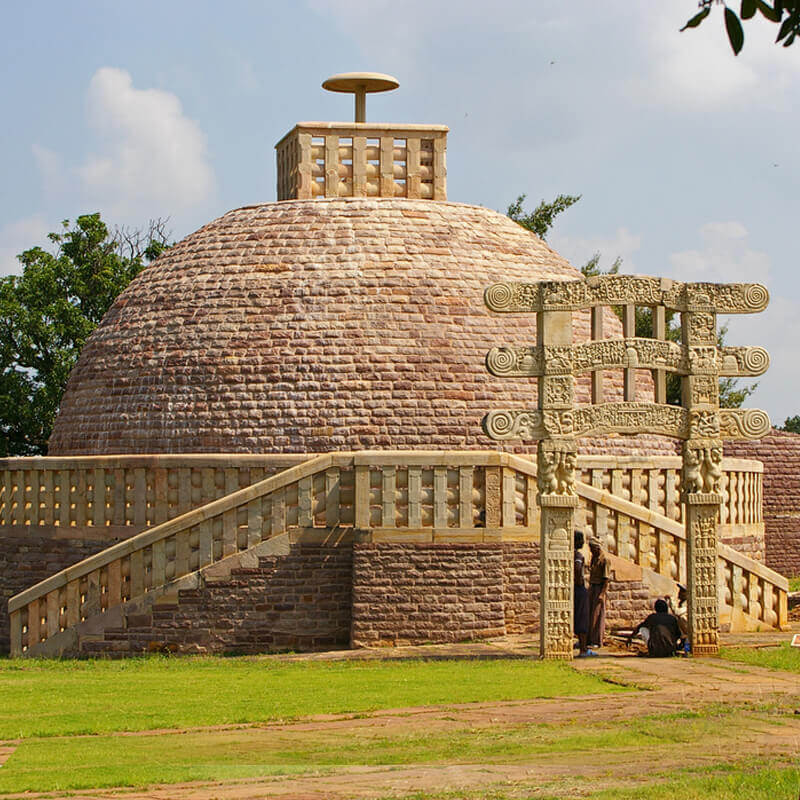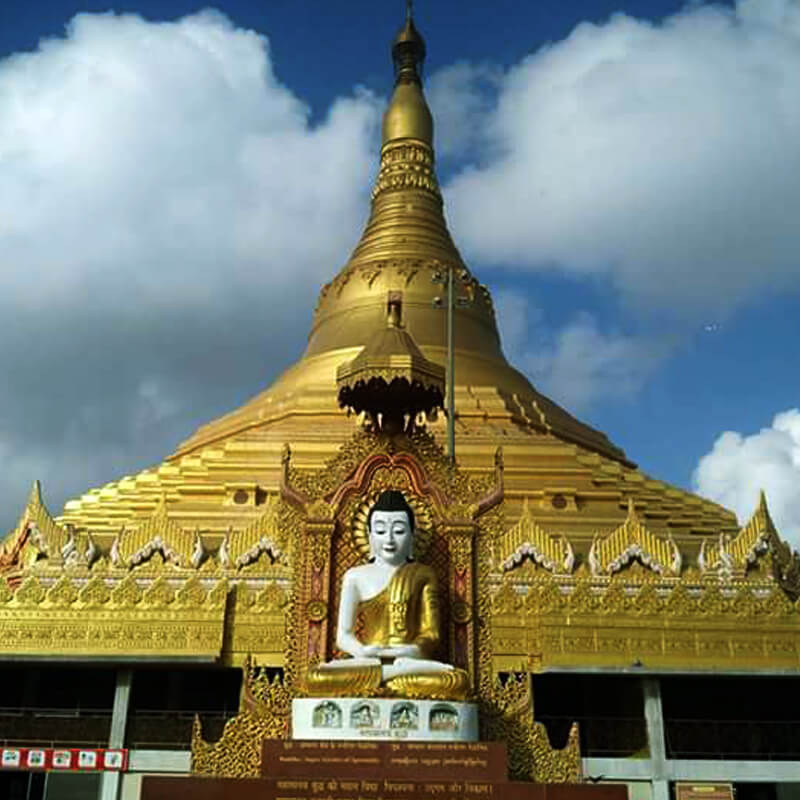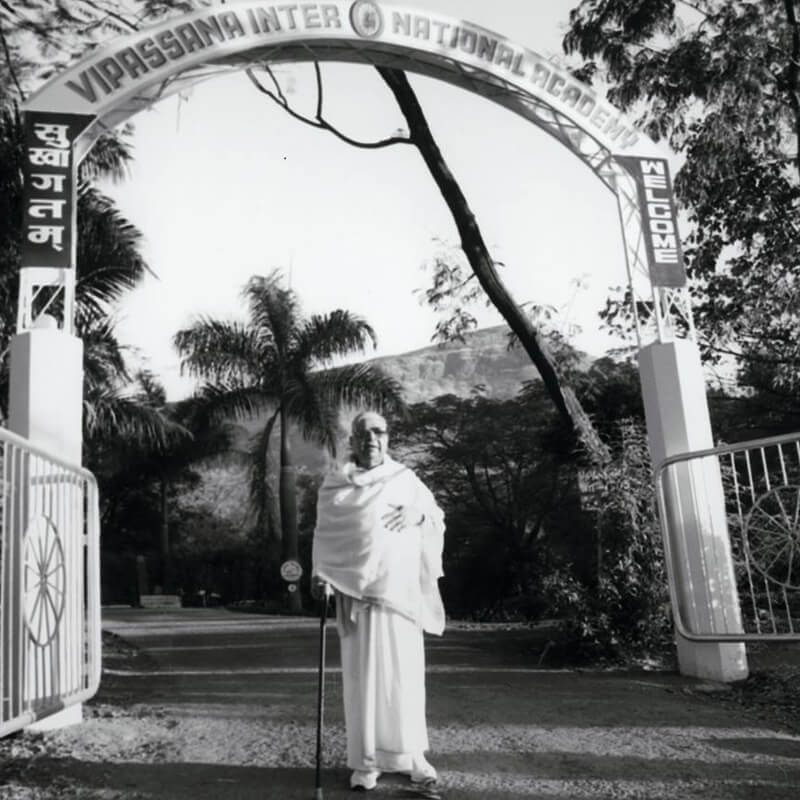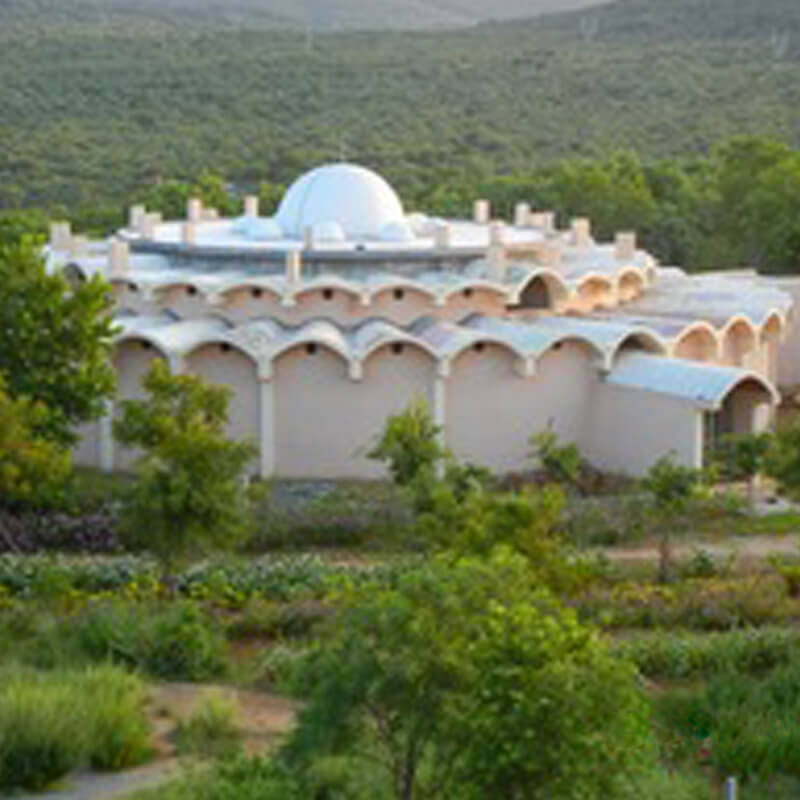August 8: Goenkaji and Mataji arrived at Brussels airport in the morning and were taken to Dhamma Pajjota, the Vipassana center in Belgium. In preparation for their visit, large dormitory tents, dining tents and a huge meditation tent were erected at Dhamma Pajjota to accommodate students from all over Europe and beyond: in all, over 800 students from 20 countries.
August 9: Goenkaji's first engagement was a press conference at the center. When asked about the purpose of his tour Goenkaji said that it was to take the message of Dhamma to the maximum number of people. He added that he was happy that the Buddha's pragmatic teaching was gaining increasing acceptance in the West and emphasized that only a healthy mind could bring peace to the world.
One journalist asked about the difference between violence and strict disciplinary action. Goenkaji explained that one should take strong physical and vocal action whenever necessary but with the base of compassion. When one lacks compassion, one's actions become violent and ineffective.
When asked about his centers, Goenkaji was quick to correct the reporter. "Vipassana centers are not my centers. They belong to the Vipassana meditators who build them and run them in accordance with the principles of Vipassana laid down by me."
Answering a question about his own advanced age and of his death, he said that the body is bound to become old, decayed and frail; it is bound to get afflicted with various illnesses but the mind remains healthy with the practice of Vipassana. Talking about fear, he said, "When one lives in the present moment, one becomes fearless."
In the television interview that followed, he exhorted viewers to give Vipassana a try. "Don't be afraid. Come and see for yourself. Vipassana is not a cult or a "foreign" faith; it is a simple mental exercise that keeps the mind healthy and happy."
One reporter asked him whether he is worried that Vipassana would not last for a long time after him. He said that he has no such worries. As long as the purity of the technique is maintained and Vipassana centers operate on a non-commercial basis, Vipassana will certainly last. The Buddha's words will act as a guiding beacon whenever there is doubt because the meditation practice is in accordance with the words of the Buddha. He warned that merely reading the words of the Buddha would not be of much help. Without actual practice, one may misinterpret the teaching of the Buddha.
That evening he gave a well-received public talk at the Cultural Centre in the nearby city of Hasselt. The talk, entitled Inner Peace for a Better World, with a simultaneous translation into Dutch, attracted over 800, filling the hall.
Goenkaji said that even the word "Vipassana" was unknown to most of the world but people are slowly understanding that it is beneficial, non-sectarian, giving results here-and-now, and involves no conversion from one organized religion to another organized religion. As usual the talk was followed by a lively question and answer session.
August 10: A one-day course was organized at Dhamma Pajjota. Meditation cushions had been borrowed from two neighboring centers to seat the many students who came for the course. On the night before, however, a severe rainstorm flooded parts of the meditation hall tent, soaking carpets and cushions. A small crew of Dhamma servers worked all night to dry the hall and replace the carpets. At 5:00 a.m. the hall was finally ready for the 750 students and 75 servers. This was the biggest course ever held outside Asia. Goenkaji went to the hall to give Vipassana.
A film crew from Reuters news agency arrived to film the day's events, producing a five-minute news article that was sent to over 900 TV stations around the world. Subsequent local news coverage showed Dhamma Pajjota and extracts of the interview with Goenkaji.
Goenkaji met students for an open session of questions and answers during the lunch-break. For many students, this was their first chance to meet Goenkaji and to meditate in his presence. The international flavor of the event was clear from the variety of languages spoken and the food provided.
August 11: Sunday was reserved for meeting various trusts and groups involved in spreading Dhamma in Europe and Israel. This provided an opportunity for countries with centers and those holding noncenter courses, like Serbia, Hungary and Scandinavia, to discuss their problems and responsibilities with Goenkaji and to clear up many local issues. Goenkaji said that each of the European countries should have a legal organization and each country should have a Vipassana center. He said that if founding a Vipassana center was beyond the current means of the trust, they should make an effort to start a Dhamma House.
He praised the unity shown by meditators. Dhamma Pajjota in Belgium is a wonderful example of meditators transcending national and linguistic boundaries to come together for the Dhamma. When the center was bought, most of the seed money came from the German meditators and most of the present Dhamma workers at this center are Dutch. As Goenkaji keeps saying, "True spirituality always unites people."
In the evening, Goenkaji gave an interview to a magazine columnist and also met some of the Vipassana teachers from different European countries. At 10:30 p.m. he met the building committee including two meditator architects to review the proposed building plan of Dhamma Pajjota.
August 12: It was the 125th day of the tour. Goenkaji gave the keynote speech to 100 participants at the Spirit in Business Conference at Vught in the Netherlands. This conference followed a similar conference in New York. Also present were about twenty-five meditators from the business world in Europe. Most of the meditators who took an active part in the conference were young entrepreneurs. After his talk, Goenkaji answered questions from the audience, which was followed by a panel discussion.
Later, Goenkaji was interviewed by a Dutch newspaper journalist, where he emphasized the role of spirituality in business. He often says, "There should be spirituality in business but we should not make a business of spirituality." Following the success of the Executive Course in Massachusetts in April 2002, a decision was made to schedule an Executive Course for businesspeople and leaders of society at Dhamma Pajjota from 7 to 18 May 2003. Goenkaji returned late in the evening to Dhamma Pajjota.
August 13: In the morning, Goenkaji gave interviews to reporters from Belgium, Holland and Germany at Dhamma Pajjota, and that evening he gave a public talk entitled Ethics and Mindfulness in Business at the Congress Hall in Cologne, Germany to over 1,000 people.
Goenkaji said that Vipassana is mindfulness of the truth inside. Greed is the root cause of all business malpractices and greed comes from lack of awareness of the truth within. There were many questions at the end of the talk followed by a press conference.
One journalist was keen to know why Goenkaji had a strict policy of not charging for his courses though it would provide financial resources to spread Vipassana far more extensively. Goenkaji said that it seemed to be a good justification to charge money but any such step is bound to harm the Dhamma. When money is involved, profit becomes the most important motive sooner or later and one starts making compromises to please the "customers". The Buddha strongly warned against making a business of Dhamma. Goenkaji returned to Dhamma Pajjota after midnight.
August 14: Goenkaji met press reporters in the morning and a Network television crew in the evening. Two prison directors from the Netherlands were joining the ten-day course starting on this day at Dhamma Pajjota. The TV reporter was keen to know about the role of Vipassana in prison reforms. Later, Goenkaji gave Anapana instructions to the students who had joined the ten-day course.
This Anapana session was Goenkaji's last formal engagement of the tour. In the past thirty-three years, Goenkaji has given hundreds of ten-day Vipassana courses to hundreds of thousands of students. The ten-day course format used by Goenkaji-and his teacher and his teacher's teacher before him-to convey the universal technique of Vipassana taught by the Buddha has benefited people from diverse cultural backgrounds, diverse socio-economic groups and diverse religious groups throughout the world.
August 15: On the last day of his tour, Goenkaji met the European Union Commissioner of International Trade, Mr. Pascal Lamy. Goenkaji left Dhamma Pajjota at 6:15 a.m. and went straight to the airport. After checking in his luggage he went to the European Union (EU) Headquarters in Brussels. Mr. Lamy congratulated Goenkaji on the success of his tour in the West and told him how appropriate it was that this method of mental culture (Vipassana) was finding wider acceptance in the West.
Mr. Lamy had already studied some of the literature that he was given earlier by a Vipassana meditator. He asked Goenkaji various questions on spirituality in general and Vipassana meditation in particular. Goenkaji explained the universal and practical nature of the technique. To his question as to whether religious people are more attracted to Vipassana or non-religious ones, Goenkaji said, "Both". The religious people find elements of their own religion in Vipassana because morality, mastery over the mind and the purity of the mind are common denominators of all the religions. Non-religious people find it equally acceptable because of the scientific and practical nature of Vipassana.
Goenkaji explained the technique of Vipassana to Mr. Lamy. Breath is a universal object of concentration that is non-sectarian and is intimately related to the mind. In a Vipassana course, one progresses from the observation of breath to the equanimous awareness of sensations. Goenkaji explained in detail how Emperor Ashoka changed from "Ashoka the Cruel" to "Ashoka the Benevolent" due to the Buddha's teaching and said that if the leaders of the modern society accepted Vipassana, it would help the society in general. The meeting was scheduled for thirty minutes but Mr. Lamy asked if the meeting could go on. Since Goenkaji had checked in his luggage at the airport he could stay a little longer.
Mr. Lamy then asked Goenkaji about the socio-economic and business situation in India and in Myanmar (Burma). Goenkaji told him that he was not involved in politics or business any more and that his entire focus was spirituality. However, he praised Mr. Lamy's efforts to help the "Least Developed Countries" and his "Everything But Arms" initiative. Mr. Lamy commented, at the end of the meeting, that Goenkaji's approach of helping the individual to create a better society complemented the Western world's efforts to provide better conditions for humanity.






